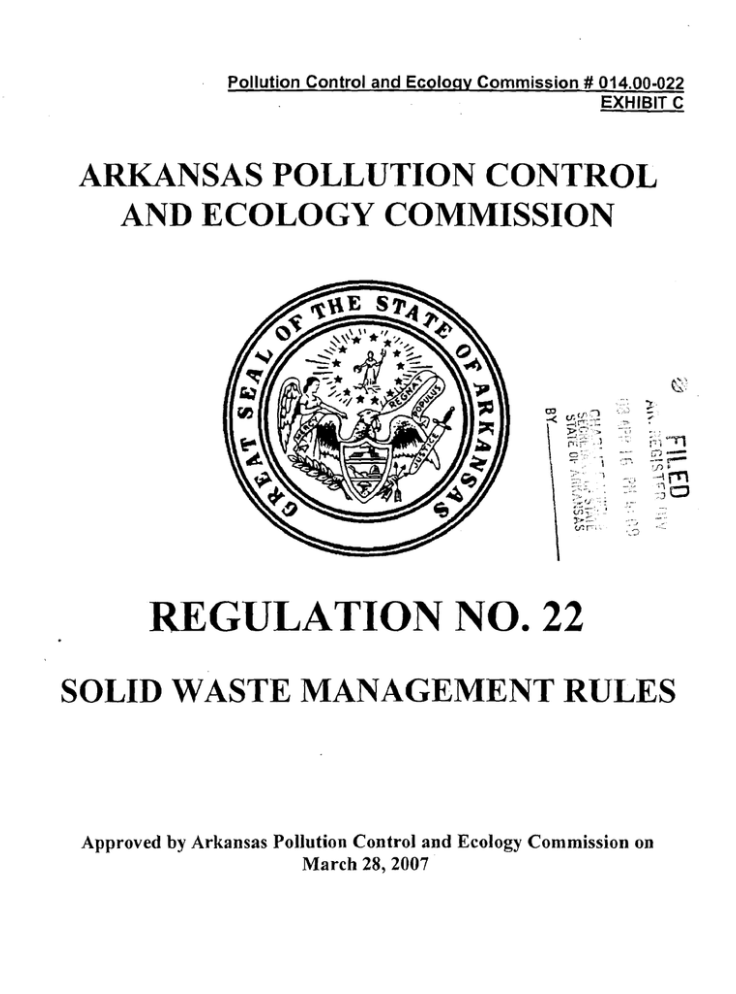Essential Arkansas Environmental Regulations
Environmental regulations in Arkansas play a crucial role in protecting the state’s natural resources. These laws help maintain clean air, water, and land, ensuring that the environment remains safe for current and future generations. As the state faces various environmental challenges, understanding these regulations is essential for residents and businesses alike. In this post, we will explore the importance of these regulations, key laws, and how they impact daily life in Arkansas.
Importance of Environmental Regulations

Environmental regulations are vital for several reasons:
- Health Protection: Regulations safeguard public health by limiting exposure to pollutants and hazardous substances.
- Preserving Biodiversity: They help protect wildlife habitats and promote the conservation of native species.
- Sustainable Development: Regulations encourage sustainable practices that balance economic growth with environmental protection.
- Community Awareness: They promote awareness about environmental issues, encouraging community involvement and education.
- Legal Framework: Regulations provide a legal framework for enforcing environmental standards and holding violators accountable.
Overall, these regulations not only protect our health and environment but also foster a culture of responsibility and sustainability within the community.
Key Environmental Laws in Arkansas

Arkansas has several key environmental laws that govern various aspects of environmental protection. Here are some of the most important:
| Law | Description |
|---|---|
| Arkansas Water and Air Pollution Control Act | This law regulates discharges into the state’s waters and establishes air quality standards. |
| Arkansas Solid Waste Management Act | This act provides guidelines for waste disposal, recycling, and landfill management to reduce environmental impact. |
| Arkansas Hazardous Waste Management Act | This law governs the management of hazardous waste to protect human health and the environment. |
| Arkansas Natural Resources Commission Act | This act supports the conservation of natural resources, including water, soil, and forests. |
These laws reflect Arkansas’s commitment to maintaining a healthy environment while promoting sustainable practices. Understanding these regulations is essential for compliance and contributing to a cleaner, safer state.
Regulatory Agencies Overseeing Environmental Compliance
In Arkansas, several key agencies are responsible for overseeing environmental compliance. These agencies ensure that both individuals and businesses adhere to the state’s environmental laws and regulations. Their work is crucial for protecting natural resources and maintaining public health. Here are the main agencies involved:
- Arkansas Department of Environmental Quality (ADEQ): This agency is the primary authority for implementing state environmental laws. ADEQ oversees air and water quality, hazardous waste management, and solid waste regulations.
- Arkansas Natural Resources Commission (ANRC): ANRC focuses on water resource management and conservation. They work to ensure sustainable practices in water use and promote soil conservation.
- U.S. Environmental Protection Agency (EPA): Although a federal agency, the EPA works closely with Arkansas state agencies to enforce federal environmental laws, including the Clean Water Act and Clean Air Act.
These agencies collaborate with local governments and communities to promote environmental awareness and compliance. They conduct inspections, issue permits, and enforce regulations to ensure that the environment remains protected for everyone in the state.
Common Environmental Issues in Arkansas
Arkansas faces several environmental issues that require attention and action. These challenges can impact public health, natural resources, and the economy. Some of the most pressing environmental issues include:
- Water Pollution: Industrial discharges, agricultural runoff, and inadequate wastewater treatment can contaminate rivers and lakes, affecting both wildlife and human health.
- Air Quality: Air pollution from vehicles and industrial facilities poses risks to respiratory health. Ensuring compliance with air quality standards is vital for reducing pollution.
- Deforestation: Loss of forests due to logging and land development threatens biodiversity and contributes to soil erosion and habitat loss.
- Waste Management: Improper disposal of solid and hazardous waste can lead to soil and water contamination, necessitating stricter regulations and community awareness.
Addressing these issues requires collaboration between regulatory agencies, businesses, and communities to create effective solutions and promote environmental sustainability.
Impact of Environmental Regulations on Businesses
Environmental regulations significantly affect businesses in Arkansas. While some may view these laws as burdensome, they also provide opportunities for innovation and sustainability. Here are some key impacts:
- Compliance Costs: Businesses must invest in technology and processes to meet regulatory requirements, which can increase operational costs. However, these investments often lead to long-term savings through reduced waste and energy efficiency.
- Market Opportunities: Regulations can create demand for eco-friendly products and services. Companies that adopt sustainable practices can gain a competitive edge and attract environmentally conscious consumers.
- Risk Management: By complying with environmental regulations, businesses can mitigate risks associated with environmental damage, including fines, lawsuits, and reputational harm.
- Access to Grants and Incentives: Many regulatory agencies offer grants and incentives for businesses that invest in sustainable practices, helping offset compliance costs.
Ultimately, while environmental regulations may present challenges, they also encourage businesses to adopt sustainable practices that benefit both the environment and their bottom line. Embracing these regulations can lead to a healthier community and a more resilient economy.
How to Ensure Compliance with Environmental Regulations
Ensuring compliance with environmental regulations in Arkansas is essential for both businesses and individuals. Not only does it help protect the environment, but it also avoids potential legal issues and fines. Here are some effective steps to ensure compliance:
- Understand the Regulations: Start by familiarizing yourself with the specific regulations that apply to your industry or activities. The Arkansas Department of Environmental Quality (ADEQ) provides resources to help you understand these laws.
- Conduct Regular Audits: Perform self-audits to assess your current practices against regulatory requirements. Regular assessments can help identify areas that need improvement.
- Implement Best Practices: Adopt industry best practices for waste management, pollution prevention, and resource conservation. This proactive approach can enhance compliance and promote sustainability.
- Train Employees: Educate your staff about environmental regulations and their importance. Training can empower employees to contribute to compliance efforts actively.
- Maintain Proper Documentation: Keep accurate records of compliance activities, including permits, inspection reports, and waste disposal records. Proper documentation can be invaluable during audits or inspections.
- Engage with Regulatory Agencies: Build a relationship with local regulatory agencies. They can provide guidance and support to help you meet compliance standards.
By taking these steps, individuals and businesses can ensure they comply with environmental regulations while contributing to a healthier environment in Arkansas.
Future Trends in Arkansas Environmental Regulations
The landscape of environmental regulations in Arkansas is continually evolving. As awareness of environmental issues grows, several trends are emerging that will shape the future of these regulations:
- Increased Focus on Climate Change: Expect more regulations aimed at addressing climate change, including policies promoting renewable energy and reducing greenhouse gas emissions.
- Stricter Water Quality Standards: With ongoing concerns about water pollution, Arkansas may adopt more stringent water quality regulations to protect its vital water resources.
- Emphasis on Sustainable Practices: Regulations are likely to promote sustainable practices in industries like agriculture and manufacturing, encouraging businesses to reduce waste and conserve resources.
- Community Involvement: There will be a greater push for community engagement in environmental decision-making. This includes public input on regulatory changes and local environmental initiatives.
- Technological Innovations: The use of technology in monitoring and compliance will increase. Smart technologies can help businesses track emissions and waste more effectively.
These trends indicate a growing commitment to protecting the environment in Arkansas, ensuring that future generations can enjoy a cleaner and healthier state.
Frequently Asked Questions
Here are some common questions regarding environmental regulations in Arkansas, along with their answers:
- What are environmental regulations? Environmental regulations are laws that govern how individuals and businesses must manage their impact on the environment, including air and water quality standards.
- Who enforces these regulations? In Arkansas, the Arkansas Department of Environmental Quality (ADEQ) is the primary agency responsible for enforcing environmental regulations.
- What happens if I violate environmental regulations? Violating environmental regulations can lead to fines, legal action, and damage to your reputation. It’s crucial to stay informed and compliant.
- How can I stay updated on changes to environmental regulations? Regularly check the ADEQ website and subscribe to their newsletters for updates on new regulations and compliance requirements.
- Are there any resources available for businesses to ensure compliance? Yes, the ADEQ provides a variety of resources, including guidelines, training programs, and technical assistance to help businesses understand and comply with regulations.
By addressing these frequently asked questions, we hope to clarify common concerns and encourage proactive engagement with environmental regulations in Arkansas.
Conclusion on Environmental Regulations in Arkansas
In conclusion, environmental regulations in Arkansas are essential for protecting the state’s natural resources and public health. They create a framework that encourages sustainable practices, ensures compliance, and addresses pressing environmental issues. By understanding and adhering to these regulations, individuals and businesses can contribute to a cleaner, healthier environment for future generations. Collaboration between regulatory agencies, communities, and businesses will be crucial as Arkansas continues to evolve its environmental policies to meet emerging challenges. Together, we can build a sustainable future that balances economic growth with environmental stewardship.


